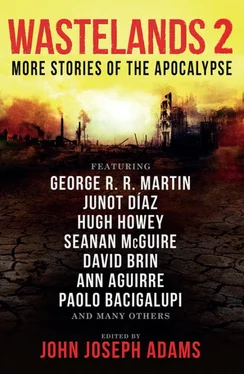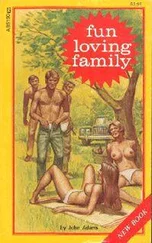“Then you’ll need moderators,” said Rabbiteen practically. “You need some users that know how to link and comment.”
“Absolutely we do,” said Cody. “This cosmic cycle was planned out and architected rather poorly. It’s closing down much earlier than the Cosmic Mother expected. Instead of crashing like this, the universes are supposed to get more stable with each new release.”
“We’re just the kickass bloggers you need!” crowed Angelo. “We can keep up our moaning and complaining for millions of years! Assuming that we’re rewarded for our efforts. I mean—is there any kind of revenue stream inside there?”
“You’ll lack nothing inside your race’s Black Egg,” leered Cody. “Except your human need to eat or breathe. There will be sex, of course. There’s always sex on the Net. The Cosmic Mother adores sex.”
“Wow,” said Rabbiteen.
“Now come closer to me,” said the toad-headed tentacle. “Technical detail: your Black Egg is a hyperdisk where the branes are riveted together via a wormhole link in the twelfth dimension. In this one special region—it’s down my gullet—the branes can’t collide. I know your primitive minds can’t understand that. Think of me as a pine cone that protects a tree’s seeds from the heat of a fierce wildfire.”
Angelo shook his bloating hands. “Never mind the license agreements, just sign us up and log us in!”
Rabbiteen had to annotate. “Really, Cody, I think it’s more accurate to say the cosmic branes pass through each other serenely.”
“Ah, you refer to the Twisterman coordinatization,” said Cody, his bloated demon head expanding with a ragged jolt. “Yes, under that viewpoint, we’ll all be transformed into our mirror-images. If you calculate in terms of the diffeomorphic quiver bundles, then it’s—”
“Hurry up!” screamed Angelo—losing his composure as his left thumb snapped off.
“Fine,” said Cody. “Over the next ten million years we can discuss these issues fully.” His wide mouth gaped open. The inside looked dank and slimy.
Rabbiteen felt another flicker of unease. Could it be that Cody was an underworld demon after all? Under his promise of cosmic transformation, was he luring them to a fate infinitely worse than mere death? How would the toad behave any differently, if he were doing that?
Cody waited with his silent mouth agape.
Up in the sky, the sun went out. The stars and moon were gone as well. Utter darkness reigned. A shrill buzz filled the nonexistent air and slid menacingly down the scale.
Pressing together, Angelo and Rabbiteen crawled into the toad’s mouth. Pushing and pulling, moving as one, the lovers wriggled their way down to the womb of the Black Egg. And of our world they saw no more.
Within the Egg’s twelve-dimensional kalpas, time and space regressed. There was neither room nor duration in which to hunger, to tire, or draw a human breath. Yet in another sense, this was a weightless and limitless utopian paradise in which happy Neetibbar and wry Olegna could gambol and embrace.
The mortal races of the next universe would occasionally comment on two glorious superclusters, titanic arcs of creative energy stenciling the void like a net—sharp and sleek, stable and sweet, weaving the warp and weft of the reborn cosmos.
If the lights at Bolton’s Tower go out, the devil gets loose. At least, that was the story. The idea spooked me when I was a kid, and even years later on those rare occasions when I traveled into its general neighborhood, which was well north on the Great Plains, far off the trading routes.
The Tower put out a lot of light, so much that it could be seen from the Pegborn-Forks road. In a world illuminated mostly by kerosene and candles, it was unique, and it was easy to believe there might be a supernatural force at work.
I’d been away from the Dakotas for years , and had long since forgotten about the thing, when the press of business and a series of unseasonal storms drove me north into my old home grounds. The weather had been overcast for a week, had cleared off during the course of a long cold afternoon, and when the sun went down, Bolton’s star rose in the east. I knew it immediately for what it was, and I knew I was close.
There’s something else odd about Bolton’s Tower.
It’s just inside the southern rim of a long, curving ridge. The ridge isn’t high. It seldom exceeds thirty feet, and sometimes it’s no more than a ripple in the grass. But it’s a strange ridge: if you follow it far enough, you discover it forms a perfect circle . You can’t see that from any single place; the ring is too big. More than sixty miles around. I’ve heard tent preachers explain that the circle symbolizes God, because it’s endless, and cannot be improved on. Just the thing to imprison Satan, they add darkly.
I crossed the ridge on foot, leading my mount. Snow was beginning to fall again, and the wind was picking up. The Tower rose out of a cluster of dark, weather-beaten buildings and a screen of trees. These structures were low and flat, dreary boxes, some made of clapboard and others of brick. Their windows were gone; their doors hung on broken hinges or were missing altogether. A roof had blown off one, another lay partly demolished by a fallen tree. A small barn, set to one side, had been kept in reasonable repair, and I heard horses moving within as I drew near.
The Tower soared above the ruin, seven stories of bone-white granite and thick glass. Porches and bays and arches disconnected it from the prairie, as if it belonged to a less mundane reality. The roof melted into banks of curved glass panels capped by a crystal spire. Its lines whispered of lost power and abandoned dreams, passion frozen in stone.
I released the straps on my crossbow, and loosened it in its sheath.
Several windows on the second and third floors were illuminated. The Tower lights themselves, red and white signature beams, blazed into the murky night.
In the windows, no one moved.
The base of the Tower culminated in a broad terrace surrounded by a low wall, elevated from the road by about twenty wide stone steps. The steps were flanked by dead hedge.
I rode past, down a grass-covered street, and dismounted in front of the barn. Max made some noises to indicate he was glad the day was over. I hoped he was right.
The barn had sliding doors. I opened one and we went inside. Three horses moved restlessly in their stalls. The place smelled of them, warm and pungent. I tied Max up, but did not remove his saddle. Just in case. I debated whether to take the crossbow, but in the end left it, on the ground that guests arriving with weapons were a lot more likely to be turned away.
Wind shook the building, and snow rattled against it like sleet. On the plains, the stuff has the consistency of rock salt. And when the wind is up the way it was that night, it can beat you down pretty good. I burrowed into my coat, pulled my hat low to protect my eyes, and strode back out into the storm.
I climbed the steps and crossed the terrace. There was a statue of someone out there, in an old dried-up fountain, a rumpled woman in Old World clothes, with the name Margaret Hanbury , and the inscription: FROM THIS NARROW SPACE, WE TOUCH THE INFINITE.
Six heavy glass doors guarded the entrance. I looked up at the Tower, cold and remote, its aspect growing and shifting in the changing texture of its spectral lights.
The doors had no give. Beyond them lay a dark lobby. I could see furniture, wall-hangings, a stairway illuminated from above. I banged on the glass.
For several minutes nothing happened. I tried again, and was thinking about moving in with the horses when the terrace lit up. A man descended the staircase, came to a stop midway across the lobby, and stood for a time studying me. Finally, he came forward, threw a bolt, and pulled the door open.
Читать дальше












